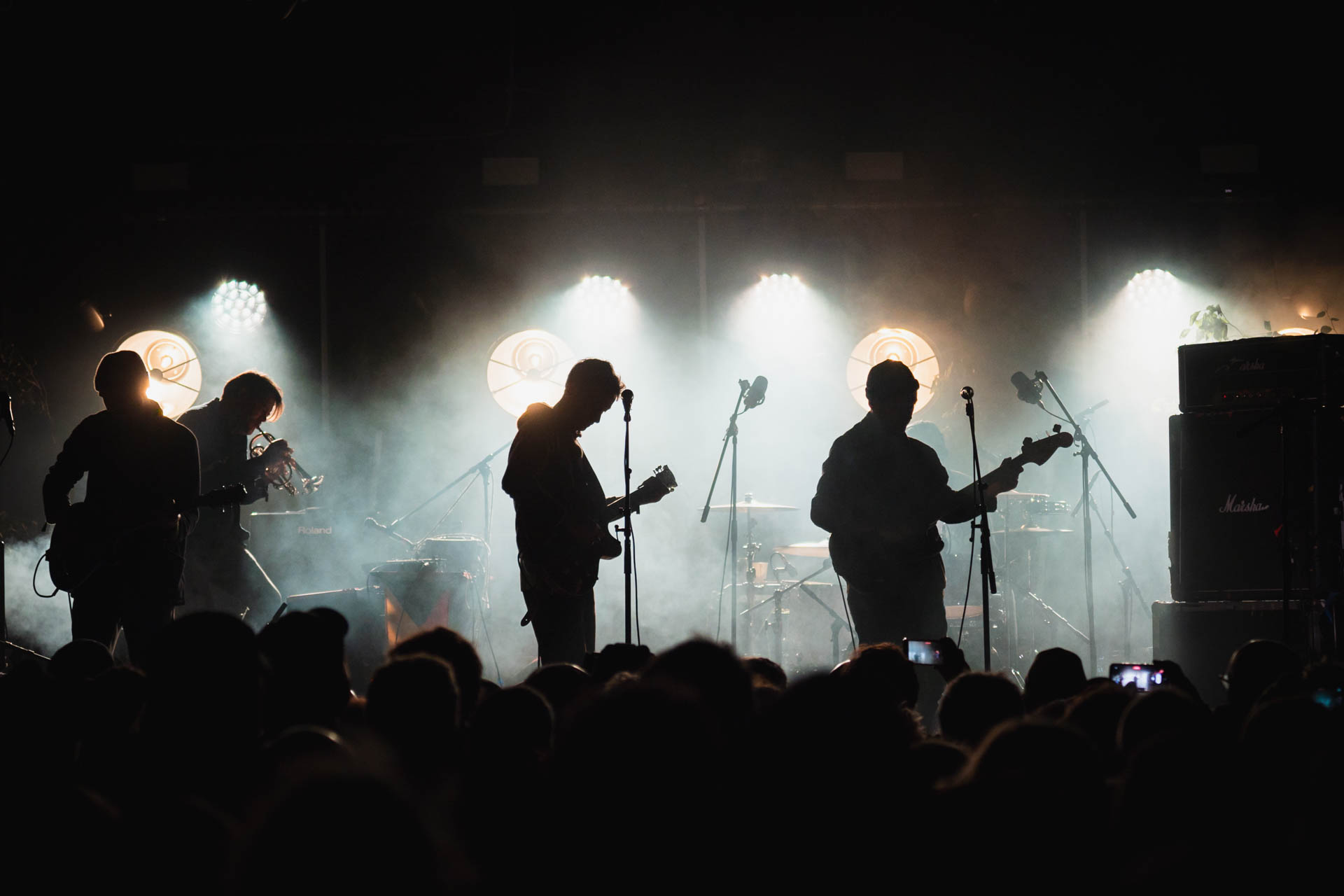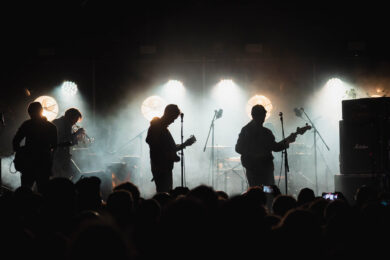Krankenhaus is an elemental festival. Even in the third decade of the twenty-first century, the route to Sea Power’s annual jamboree in the barn of Muncaster Castle’s Home Farm on the Cumbrian coast is a rowdy dialogue with topography and weather. The railway journey from Lancaster is one of Britain’s finest, winding past and sometimes over the vast mud flats and marshes of the estuaries that drain the Cumbrian fells. Here a curlew, there a wreck, a fisherman, the remains of Barrow’s industries. After bad weather, station information boards often glow with the dread ‘CANCELLED’. The road route only just inland twists and turns through woods and scrappy fields, tarmac still slick with surface water long after the rain has stopped. A short cut across an open fell is currently closed. In a talk by local author Karen Lloyd on Saturday morning, we discover that historically the main way into the south western Lakeland fells and then on through towards Carlisle and Scotland wasn’t inland at all, but either by sea or over the treacherous sands of Morecambe Bay – the route often used by William Wordsworth, the poet who did so much to Romanticise (initial capital intended) this area. This information is a quiet revelation, emphasising that Krankenhaus is an event at which the location is almost as important as the bands booked to play it.
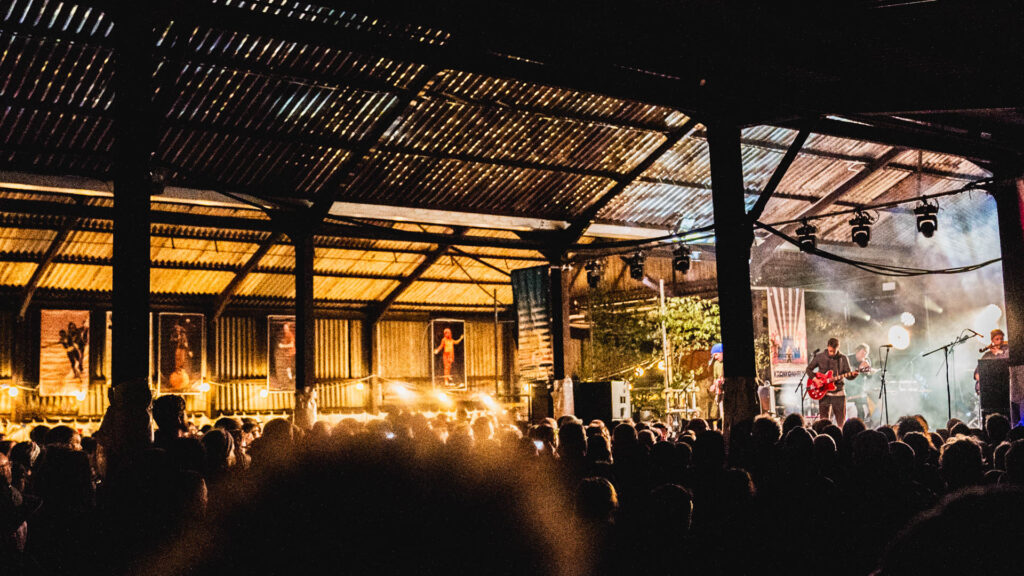
In an early edition of Listen Here I wrote about the joy of leaving a festival to go and explore the surrounding area for psychic enrichment. This offended some people, who felt one ought to be utterly focussed on the music. At Krankenhaus, Sea Power positively encourage you to clear off, either via their official guided walks, beachcombing, moth hunting and birdwatching activities, or under your own steam. It’s as if they want to share the surroundings with the audience, and hope they might bring it back into the barn with them, much as their stages have long been strewn with foliage from the nearest park or woodland.
On the Saturday afternoon, my pal Rob and I drive up the Esk valley (via a pilgrimage to peer through the windows of the former home of angling writer and ‘difficult character’ Hugh Falkus), to walk up to Hardknott Fort, dominant over the steep pass from which it gets its name. Most of the walls still stand, their stones as sharp and bright as the day they were laid during the reign of Roman Emperor Hadrian in the second century AD. Roman auxiliaries, the Fourth Cohort of Dalmatians from what is today Croatia, were stationed here, and a large Vicus, or settlement, grew up in the wild land around the falls, providing these 500 servants of Empire with their daily needs.
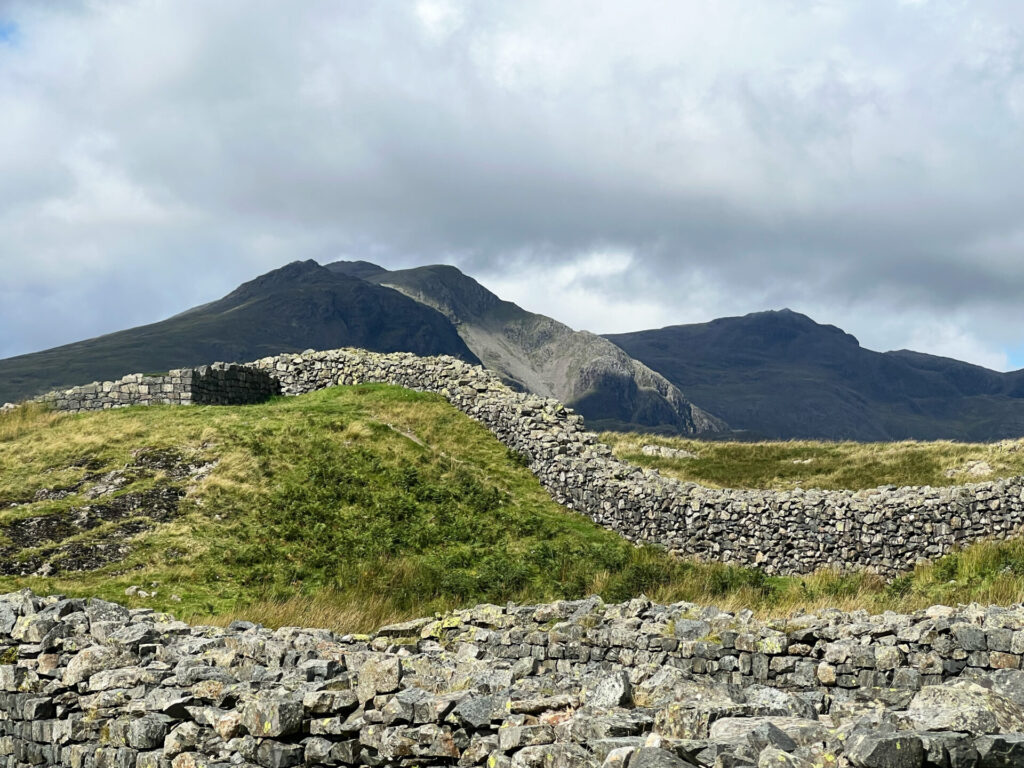
Over a skyward surge that takes the walls over a rise, the peaks of Scafell slide in and out of a misty shroud, undulating between grey, purple, blue. It must have been a lonely place to be sent to, a sensation only reinforced by the eternal power of what surrounded you – and can still feel overwhelming today. The fells and mountains are rarely silent, and their song is never the same. Rock, grass, scrub trees, all play the mass of air that moves in from the Cumbrian coast and Irish Sea. Humans are fairly recent in the geological timescale in this territory, as are the objects we brought into it that add their own notes – the rattling flap of my waterproof or, 2000 years ago, a Legionary’s tunic; wind howling through modern wire fences or Hardknott’s vanished palisades; the bleat of the Herdwick sheep that contributed to the deforestation of the valleys, and removed the sound of moving leaves. The same wind brings water as rain that falls, frequently sideways, before it finds its way into the upper reaches of the River Esk in the valley below. After the downpours that precede the Krankenhaus weekend, this makes its own music to contribute to the wind, a deep and bassy thrum under the lighter fizz of the spray as it moves down the channel and pools it has carved through the rock. This we humans add to with the oomska squelch of walking shoes in soggy ground, just as those Roman boots did so long ago. The Esk valley is alive with a symphony of water’s determination to reach the sea; a symphony that has been performed ever since the end of the last Ice Age.
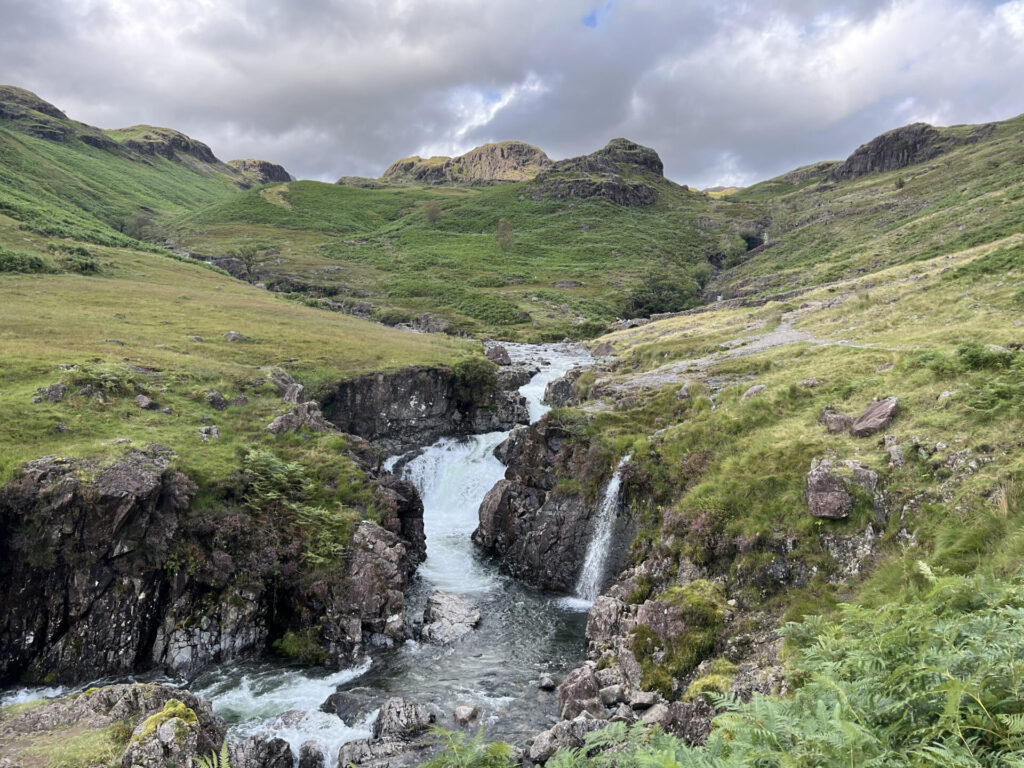
On the Sunday night of Krankenhaus, we’re told that Sea Power will be playing material around their soundtrack records, the peerless Man of Aran, BBC4 doc From The Sea To The Land Beyond, and the music written for computer game Disco Elysium, the band’s surprise commercial success in recent years. As ever with Sea Power (perhaps due to their taciturn modesty), this intelligence is only half the truth, and what transpires is a set of such emotional weight and power that I’m not the only one to be utterly floored by it. You might for genre simplicity’s sake say this collection of slow-burners and epics is Sea Power as prime nature-inspired post rock group, but you’d be missing the point. Sea Power certainly touch on both psychogeography and psychedelia, yet those ideas can be so focused, respectively, on the intellect or the mangling of it, that they lose heart, warmth and intimacy. Tonight, they play songs in which their ability to tap into a sense of space, place and the natural world beautifully dovetails with intensely personal sentiments in the sparse lyricism. In an hour or so that eddies and unfurls and glows like the clouds and rain and unusual light of late August, ‘Come Wander With Me’ and ‘The Smallest Church In Sussex’ are rendered as haunting folk, the tumbling epic ‘North Hanging Rock’, with a line about becoming “part of the scenery”, is entirely fitting for this windblown festival weekend. ‘Cleaning Out The Rooms’ is laden with the emotional displacement that comes in a time of grief or intense personal change, the quiet shudder of ‘Once More Now’ reflects a gentle hand to help put yourself back together again.
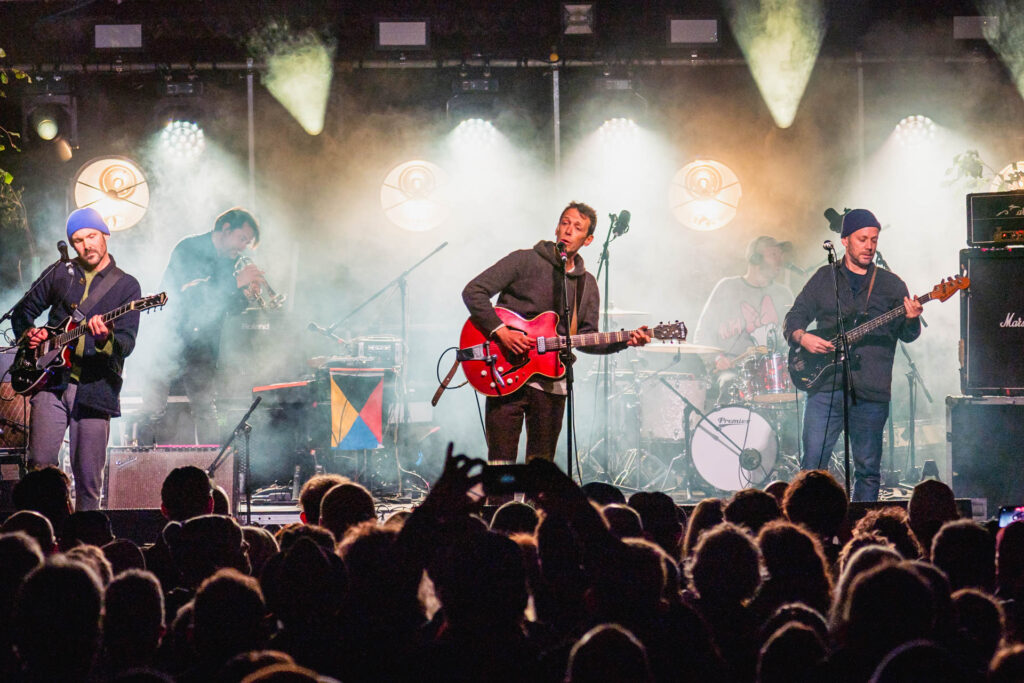
Most powerful of all is ‘Lakeland Echo’, the centrepiece of 2022 album Everything Was Forever, and perhaps the most directly autobiographical song the group have ever written, full of lines spoken by Scott and Neil Wilkinson’s dad Ron and now sung by Neil, from the incongruous “Better get the sun hats” to Wilkinson Snr’s commentary on the band’s music – “that’s a grand track! That’s a good one!”. It’s not a song about the landscape per se, as the only reference to what surrounds us is the title (the local newspaper delivered by Neil and his brother Scott to earn coin) and a line about going down to the river and canal. Perhaps this is because, growing up here, this wasn’t a place to romanticise or see through the rose-tinted glasses of the visitor, with all our cultural baggage of what the Lake District means – for them, it was just home. Nevertheless, there’s something psychedelically uncanny and emotionally poignant about how perfectly it seems to knit together band, audience, barn and what lies in the gathering darkness beyond, out to the valley a few fell tops to the east where the two boys grew up. “That’s for Ron”, says his son Neil at the end. It’s a wonder how he was able to sing those words for his old man, who died a couple of years ago, and hold it together… but holding it together is what Sea Power do, against adversity, the state of independent music and not being from the affluent backgrounds required for a career in it, fickle fashion, and so on. Krankenhaus, now in its fourth incarnation, has allowed Sea Power, in their own determined, arguably bloody-minded, inimitable way, to put together an expression of themselves that I don’t think anyone else really comes close to, and its location is at the heart of this. Everyone here has brought something of their own aesthetic response to this landscape to Krankenhaus, along with their intensely personal relationship to the group. A lot of music (or for that matter literature) inspired by landscape merely hymns to it, following the tradition that all too often is willing to set the human apart from the natural world, or to be suspicious of our right to roam within it. For Sea Power, it’s always just felt as if it’s part of who they are, which is why I’ve been obsessed with the buggers for nearly a quarter of a century, why I have seen them play live countless times (100? 150? Who knows?) anywhere from shit Carling hovels to churches to the Large Hadron Collider or the Arctic Circle to a misty Glastonbury; and why some time ago they inspired me to try and pluck up the courage to write about places and people myself. There’s a strong sense that everyone in this cold barn is feeling something intensely personal along these lines tonight. Nobody is ashamed to admit after that tears have been shed.
A few light blue squares away on the OS map, the Esk valley continues to play its music in the darkness, the rain running off the stones of Hardknott fort as it has for two thousand years, rushing down the crags and through Throstle Garth and Tongue Pot, in the lower reaches rising over rocks like rounded glass before breaking in foam under stone bridges and out to the tidal waters of the Irish Sea.
On the train back down to London the next day, my mind doesn’t want to leave the fells. I’m curious about the route from the coast past Muncaster Castle and up to Hardknott Fort, the sort of archaeological exploration that has always been adjacent to my love of Sea Power. As the train Wi-Fi flickers in and out, I look at old maps, English Heritage pages, and finally find a website that had used Lidar ground radar imagery to track the faint line of the long-vanished Roman road. There it is, straight and wide and a lurid green on the visualisation, rising up the slope from just north of the Roman bath house ruins down in Ravenglass and disappearing right under Muncaster Home Farm barn where we’d all spent the last few days. It’s odd to think of the Roman Auxiliaries marching up the hill and into the space where those barn walls now stand, buffeted by the same music of the wind and the rain that today shake the beams and dirty Perspex roof tiles, singing who knows what marching songs or laments to lost loves or families far away. I think of them joining the vibrations of Sea Power’s music, of this landscape, this whirling together of something ancient, something fond, something new.


